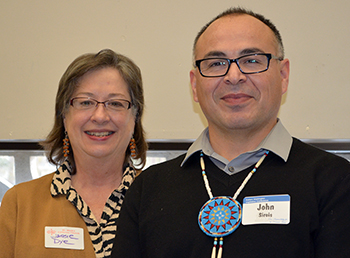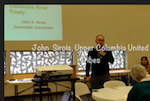2016 Eastern Washington Legislative Conference
Speakers offer overview of environmental and climate issues for state, world
Jessie Dye discusses toxics, oil transport and hotline
Jessie Dye of Earth Ministry and John Sirois of the Upper Columbia United Tribes (UCUT) led a workshop on environmental issues for the Eastern Washington Legislative Conference.
There are many environmental issues to address, she said: keeping the cap on carbon, preventing cuts from the clean water fund, keeping the air clean and increasing support for solar and wind power in the grid.
 |
Jessie Dye leads workshop with John Sirois. |
“Many issues are not legislative,” she said. “Fossil fuel is expensive, dirty and dangerous. The tar sands are toxic. The Powder Basin coal is dirty. The Bakken oil is fracked so deep in the earth that natural gas is dissolved and explosive. To reach the market in Asia, it is transported through Spokane by train.
“Our legislators and administration know oil transport is a concern of Spokane, as well as Vancouver and Seattle,” said Jessie, noting a turnout of more than 500 at a recent hearing. “It’s a powerful message to those in the Bakken field not to allow trains through without regulations.
“The faith community has a powerful role to say no to sending trains through highly populated areas,” she said.
Jessie added that legislators “need your voices” and that Washington has a legislative hotline, 800-562-6000, citizens can use to call their legislators to influence their votes.
For information, call 206-632-2426 or email jessie@earthministry.org.
John Sirois raises issues for indigenous people at COP
John Sirois, committee coordinator with UCUT and a member of the Colville Confederated Tribes, was recently among indigenous participants at the Conference of Parties (COP) climate change conference in Paris.
“It’s time for us to come together,” said John, aware that his work for fish passage and water quality here have global implications.
 Watch the workshop Youtube video |
“My ancestors lived on the Okanogan and Wenatchee Rivers. We ate salmon, bear, bitterroots and serviceberries,” he said. “We were not people of science but we knew when the salmon ran. We were not nomadic, but we knew where we were to be at a certain time. We practiced applied science, connecting our lives to the water, land, air and temperature.”
At COP, he said indigenous people have been taking responsibility to monitor effects of climate change and form coalitions to provide a better world for generations to come.
“Humans live in balance in the world. If climate changes, the world changes. Root and berry seasons are earlier. The hottest years on record were 2013, 2014 and 2015,” he said.
As part of that effort, UCUT and tribes advocate for indigenous voices to be heard as the Columbia River Treaty is renegotiated. Their voices were not included in that treaty or when Grand Coulee and Chief Joseph dams were built.
“Needing sustainable fish passage, we know there are now new technologies for fish to pass without high costs by using whoosh and salmon cannons. Juveniles going downstream are channeled into a pipe and piped down beyond the dam.
“Climate change will have a severe impact on tribes,” he said, “but indigenous people were not at the table in Paris, even though we are at risk of losing our land, cultures and natural heritages.”
“For Pacific people, two degrees of change means their islands will be flooded,” John said.
The 187 representatives at COP signed a binding document to limit emissions. It calls for healthy forests, recognition of indigenous rights and traditional knowledge.
He urged conference participants to challenge legislators about warming oceans, changing snow packs and water supplies, the storm season, diseased salmon in warmer rivers and forest health.
“Indigenous species are moving north. We now have raccoons but we had no word for raccoons in our language,” John said. “COP did not bring all we want, but it was a huge step in the right direction.
For information, call 209-2414 or email john@ucut-nsn.org.
Copyright © March 2016 - The Fig Tree






